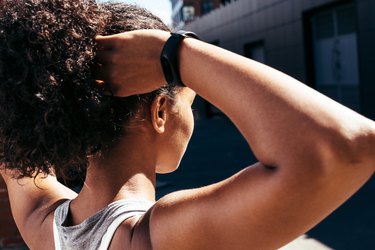
We like flakes in our cereal, and we love them on the ski slopes. But flakes on your scalp? They're no fun at all.
A whopping 50 percent of Americans have dandruff, according to a December 2015 review in the Journal of Clinical Investigative Dermatology. And if you're reading this, you're probably one of them. So, how do you banish this itchy, annoying condition?
Video of the Day
Video of the Day
We dug into the research and quizzed Janiene Luke, MD, associate professor and residency program director at the Loma Linda University Department of Dermatology and spokesperson for the Skin Color Society.
Behold, the best, quickest and most effective home remedies for dandruff.
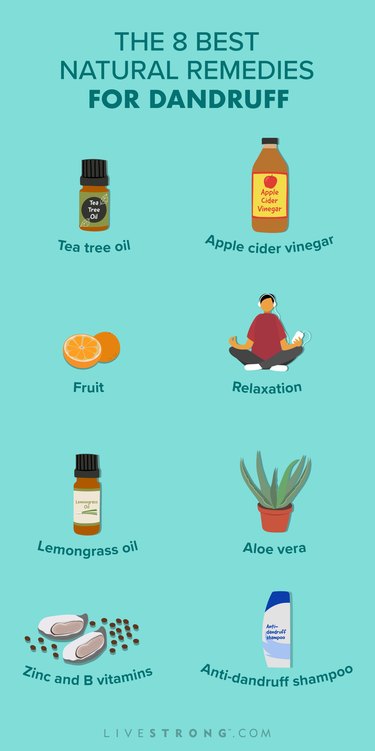
1. Tea Tree Oil
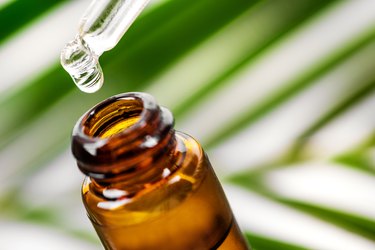
Distilled from the leaves of the tea tree in southeast Australia, this oil has been used in traditional medicine for thousands of years. Today, it's touted as a treatment for everything from acne to athlete's foot.
And for good reason: "Tea tree oil has anti-inflammatory, antibacterial, antimicrobial and antifungal properties," says Dr. Luke. "Washing your hair with shampoo that contains tea tree oil is the fastest all-natural way to get rid of dandruff."
How to Use Tea Tree Oil for Dandruff
Never apply pure tea tree essential oil directly to your scalp. "You can become sensitized to it and develop allergies," Dr. Luke says. "Instead, mix a couple of drops into your regular shampoo, or purchase shampoo that lists tea tree oil as an ingredient."
Her pick for the best natural dandruff shampoo is Giovanni Triple Threat Tea Tree Invigorating Shampoo (GiovanniCosmetics.com, $9.99). It's paraben-free, cruelty-free and vegan. She's also a fan of Paul Mitchell Tea Tree Special Shampoo (Ulta.com, $14.50).
As for how frequently to wash with tea tree shampoo? "It depends on how much dryness, flaking and itching you have, as well as the texture of your hair," Dr. Luke says.
You can use it several times a week if you have an oily scalp and hair. "But for people with darker skin tones and kinky hair, this may not be feasible," Dr. Luke says. "In that case, shampoo your hair once a week or every two weeks."
2. Apple Cider Vinegar
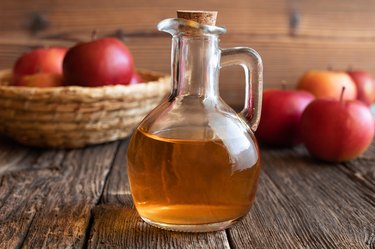
Apple cider vinegar is a natural antibacterial and antifungal agent. "It targets and kills Malassezia," the yeast that causes dandruff, Dr. Luke says. "It also helps clarify your scalp by removing excess product buildup and thick scales and decreasing oil."
How to Use Apple Cider Vinegar for Dandruff
"Applying it directly can irritate your skin," Dr. Luke says.
Like with tea tree oil, it's safer to stick to a natural hair product that contains it. Her favorite is dpHUE Apple Cider Vinegar Hair Rinse (Ulta.com, $35). Others that get Dr. Luke's seal of approval: Head & Shoulders Apple Cider Vinegar 2-in-1 (Walmart.com, $5.97) and Sun Bum Detox Shampoo (SunBum.com, $9.99).
If you prefer to concoct your own formula, mix equal parts ACV and water and pour it all over your scalp (you may want to apply it with a spray or peri bottle). Let it sit for five minutes before rinsing it out. "Use as a clarifying treatment once a month, or as often as once a week," Dr. Luke says.
3. Anti-dandruff Shampoo
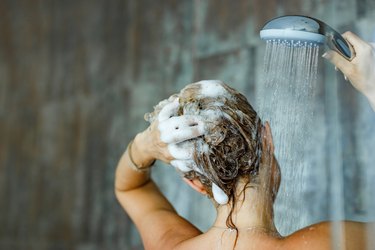
Over-the-counter options often work well.
"Zinc pyrithione is anti-inflammatory and anti-microbial, and is the most common ingredient you'll see in drugstore anti-dandruff shampoos," Dr. Luke says.
An August 2018 Nature study found that zinc pyrithione effectively removes Malassezia.
Another ingredient to look for is coal tar. A May 2015 review in BMJ Clinical Evidence suggests that coal tar shampoo significantly reduces flaking and redness associated with dandruff.
How to Use Shampoo for Dandruff
Simply follow the shampoo bottle instructions. Dr. Luke is a fan of Head & Shoulders Royal Oils (BedBathandBeyond.com, $6.99).
"It is formulated specifically for natural, relaxed and curly/kinky textures," she says, and she likes that some of the products in the Royal Oils collection contain coconut oil. "It also has some leave-in options that people can use in between wash days if they are shampooing less frequently."
Related Reading
4. Fruit
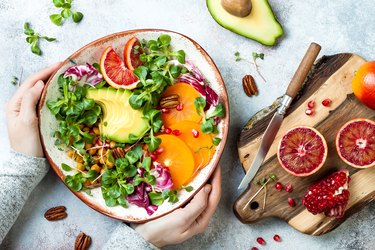
Better grab an apple! In November 2017, the Centers for Disease Control and Prevention (CDC) reported that only 12 percent of Americans meet the daily recommendation for fruit intake. And that could be bad news for your scalp.
A January 2019 Journal of Investigative Dermatology study analyzed the association between diet and seborrheic dermatitis, which is the scientific name for dandruff. It determined that chowing down on plenty of fruit reduced the risk of dandruff by 25 percent, while consuming a Western diet increased the chances of scalp flurries by 47 percent for people AFAB.
While this study only shows correlation and not causation, it can't hurt to add more fruit to your diet (it comes with a whole host of health benefits, after all).
How to Use Fruit for Dandruff
Eat at least 1 1/2 to 2 1/2 cups of fruit per day, according to the U.S. Department of Agriculture. Meanwhile, cut back on unhealthy staples of the Western diet. Think: foods that are processed, fried or sugary.
5. Relaxation
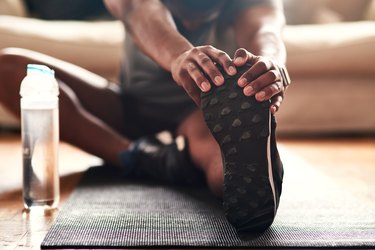
Stress can mess with your head in more ways than one. A January 2018 study in the Saudi Medical Journal revealed that highly stressed people suffer more from oily, waxy patches or flakes on the scalp.
Researchers believe this happens because stress alters your hormones, leading to an uptick in the production of scalp sebum, an oil that Malassezia feeds on.
Dandruff is also more common in immune-compromised individuals — and stress suppresses your immune system.
Finally, stress weakens the skin barrier. Not only does a damaged skin barrier result in moisture loss and dryness, but it also allows Malassezia to more easily penetrate the skin and cause irritation.
How to Use Relaxation for Dandruff
First, limit your media intake — constantly consuming bad news about COVID, the Taliban and climate change takes a toll on your wellbeing. Instead of scrolling through your news feed, carve out time every day to connect with friends and loved ones.
And take good care of your body: Meditate, exercise, get outdoors, do things that bring you joy and get plenty of rest (seven to nine hours of sleep each night). According to the CDC, these are the best strategies to unwind.
Related Reading
6. Lemongrass Oil
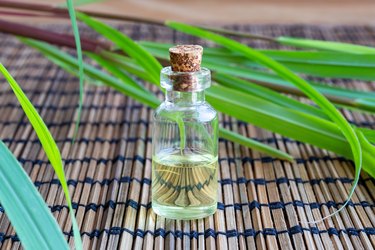
A small 2015 study in Complementary Medicine Research discovered that people who used a hair tonic containing lemongrass oil had a significant reduction of dandruff after one week, with even better results at week two.
According to the researchers, lemongrass essential oil is active against yeast.
How to Use Lemongrass Oil for Dandruff
As with any essential oil, don't apply it straight on the skin. Rather, try a hair product featuring lemongrass oil or mix a few drops into your regular shampoo.
7. Aloe Vera
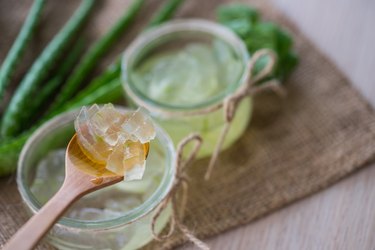
You've probably heard that aloe can soothe a sunburn, but did you know it might also fight flakes?
A 2012 study in the Journal of Pharmacognosy and Phytochemistry looked at medicinal uses of aloe vera in India, where it has been applied topically to heal skin injury, damage and irritation. The study explains that this power plant improves immunity and has anti-inflammatory and antiseptic properties.
How to Use Aloe Vera for Dandruff
To treat dry hair and scalp, researchers suggest rubbing aloe vera gel on the scalp. Let it sit for 30 minutes, and then rinse well.
8. Zinc and B Vitamins
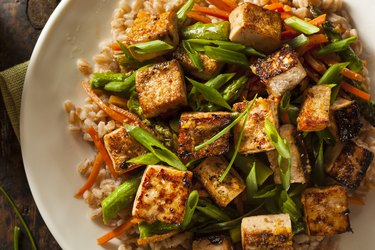
Adjusting your diet might help soothe your scalp. The Journal of Clinical Investigative Dermatology review suggests that people who have deficiencies in zinc and vitamins B3, B6 and B12 are more prone to dandruff.
While this doesn't prove causation, it can't hurt to make sure you're getting adequate amounts of these nutrients each day.
How to Use Zinc and B Vitamins for Dandruff
Make sure you're meeting the recommended daily amount for these nutrients.
Foods high in zinc include shellfish, meat and beans. To incorporate more vitamin B, gobble up meat, seafood, chickpeas, dairy and fortified nutritional yeast.
What About Coconut Oil?
Here's the deal: Coconut oil is fab for your hair and might help soothe some symptoms associated with dandruff — but it won't nix scales for good. "Coconut oil moisturizes the scalp, which will help with itching and may reduce the thickness of the flakes," Dr. Luke says. "But it will not treat the dandruff itself."
Indeed, a March 2021 study in Nature revealed that for people assigned female at birth (AFAB) with healthy scalps, coconut oil reduced the yeast that causes dandruff, while increasing levels of healthy flora on the scalp microbiome. But people AFAB who suffered from dandruff didn't experience these benefits. Bummer!
What About Baking Soda?
Rumor has it, baking soda balances the pH of your scalp, while exfoliating flaky dead skin cells.
True or false? "I'm not sure why there is such fascination with baking soda, but it won't remove the yeast that causes dandruff," Dr. Luke says.
Can You Completely Get Rid of Dandruff?
Sorry to break it to you, but typically there is no permanent cure for dandruff.
"Malassezia yeast is part of our normal flora," Dr. Luke says. "It naturally resides on the surface of the skin and feeds on sebum, an oil produced by the body."
In that case, why doesn't everybody have dandruff?
"Some people are more sensitive, and their body triggers an inflammatory response to Malassezia that results in seborrheic dermatitis, or dandruff," Dr. Luke says. "Although you can control and manage the symptoms, it tends to be a chronic condition."
One last thing: If you have very thick scales, a lot of redness and/or hair loss, make an appointment with your derm.
"These are indications that something else is going on, such as psoriasis," Dr. Luke says. "Psoriasis is approached differently from regular dandruff and treatment should be directed by a physician."
- Journal of Investigative Dermatology : "Association between Diet and Seborrheic Dermatitis: A Cross-Sectional Study"
- USDA: "Fruits"
- CDC: "Only 1 in 10 Adults Get Enough Fruits or Vegetables"
- Saudi Medical Journal : "Association of psychological stress with skin symptoms among medical students"
- CDC: "Coping with Stress"
- Nature: "Understanding the Mechanism of Action of the Anti-Dandruff Agent Zinc Pyrithione against Malassezia restricta"
- BMJ Clinical Evidence: "Seborrhoeic dermatitis of the scalp"
- Complementary Medicine Research : "Anti-dandruff Hair Tonic Containing Lemongrass (Cymbopogon flexuosus) Oil"
- Journal of Pharmacognosy and Phytochemistry: "Aloe Vera: The Miracle Plant Its Medicinal and Traditional Uses in India"
- Journal of Clinical Investigative Dermatology : "Seborrheic Dermatitis and Dandruff: A Comprehensive Review"
- Nature: "Longitudinal study of the scalp microbiome suggests coconut oil to enrich healthy scalp commensals"
Is this an emergency? If you are experiencing serious medical symptoms, please see the National Library of Medicine’s list of signs you need emergency medical attention or call 911.